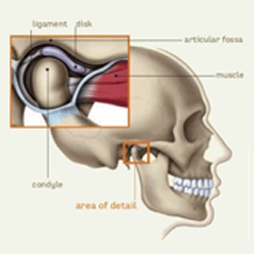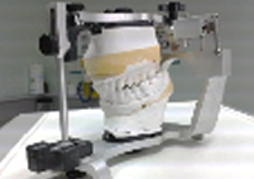The way your teeth meet when your top and bottom jaws close down on top of each other is known as your 'bite'. If your teeth don't fit together properly, you could have malocclusion or 'bad bite', which can cause problems with your teeth, gums, the temporo-mandibular joint (TMJ) and the muscles in your face.
This misalignment, often referred to as TMJ disorder, can also cause some people to clench the jaw and grind their teeth at night. This can lead to facial pain, headaches, discomfort and clicking when biting or chewing, migraines as well as neck and shoulder pain, even back pain.
If you recognise any of these symptoms or suffer with these on a daily basis, you will need to see a dentist to treat your problems or refer you to a specialist if necessary.
In some cases, the treatment includes wearing a hard plastic appliance at night. This is made to measure and fitted onto your bite accurately, so that when you bite on it, your teeth are in a position where your muscles are relaxed. This also stops your teeth from becoming worn down by grinding and protects them. Depending on the origin and severity of your problem, you may need orthodontic treatment or maxillofacial surgery. Other solutions may include replacing missing teeth or adjusting any ill-fitting bridgework that you may have.
The important thing to do is see your dentist as soon as possible so your problem does not become worse over time and require more drastic measures to correct.
Do you suffer from any of the following??

Adding a certain amount of stress to your life can push you from having no problems at all to having lots of problems
- Undiagnosed headaches
- Undiagnosed jaw-ache
- Undiagnosed face, undiagnosed neck or Undiagnosed shoulder pain
- Undiagnosed dizziness
- Undiagnosed earache and/or Undiagnosed tinnitus
If you've answered "yes" to some or all of the above, you may be suffering from what we refer to in the dental industry as 'Temporal Mandibular Joint Disfunction' or TMJD for short.
Your Jaw
The temporo-mandibular joints (TMJ's) are the joints that hinge when we open and close our mouths. They also move from side to side in the action of chewing and forward & backward when we bite into something with our front teeth. You can feel these movements by placing your finger directly in the front of your ears whilst opening and closing your mouth. There are also lots of sets of muscles in the face, head and neck that work together to aid these movements - some muscles open the jaw while others close it, move it backwards or forwards and side to side.

Our TMJ's are unique in that, not only are they the most constantly used joints in the body, they contain stress-absorbing pads made of acartilage-like material called 'discs'. We also have discs in our knees and spine but rather than staying in one position, the discs in our TMJs 'slide' which makes the jaw joint considerably more complex than in other parts of the body.
When our joints begin to suffer…
The position of our teeth have the ultimate say on where our jaws close and many people have small errors in their bite which make them put their teeth together in a position of 'comfort' rather than a position that is right for the jaw. This means that the muscles relating to these jaw movements may begin to suffer from fatigue because they can never fully relax. You could be aware of headaches, eye pain, neck and shoulder pain – or a combination of these symptoms, including toothache. Certain teeth/fillings are also more likely to break due to the 'points of stress' they are subjected to when there's a disharmony in your bite.

Symptoms of misaligned teeth may be clenchinh, grinding, premature tooth wear and stress on the muscles and tendons - much of which may occur during sleep
So what should you do about it?
- You can continue to live with the problem - which is perfectly plausible if you feel your symptoms are mild enough to allow you to do this
- Be referred to a specialist surgeon for invasive, surgical intervention
- Seek intervention via NON-SURGICAL means using an acrylic 'splint'
Non-surgical intervention using an acrylic splint
TMJ splints are made of plastic and work by taking the load off the jaw joint. They are shaped to the individual and are designed to both line up the jaw and head correctly, and reduce the activity of the muscles that move the jaw joint.
Instead of the teeth clamping together, they sit on the plastic platform, allowing the jaw to relax and return to the 'home' position thus enabling the jaw muscles to rest.

The appliance is worn for a given period of time and adjusted/refined until it eliminates the bite disharmony and pain. Being able to simulate your particular jaw movements on an articulator (right), means we are able to save you time in the dental chair as much of the study into your bite relationship has been carried out prior to the appointment.
At Burwell we have been successful in helping many patients put an end to chronic discomfort using such appliances and offer a free 15 minute consultation to existing patients of the Practice.

Models mounted on an articulator - studying the way your teeth meet or "should" meet
Once the initial diagnostic phase of treatment is completed and the TMJ pain eliminated, permanent treatment will then be prescribed to duplicate the effects of the appliance, e.g. equilibration or occlusal adjustment, orthodontics or restorative procedures such as crowns.
In this way, the bite need not be permanently altered until the problem is accurately diagnosed via the splint.
If you would like further information on the temporomandibular joint you may find the following link useful: The British Society of Occlusal Studies - TMD FAQs'
At Burwell, we are trying to address the cause of the problem rather than you having to deal with the symptoms and other complications TMJD can cause.
If you think we can help, please give us a call.
Back to How can we Help?


